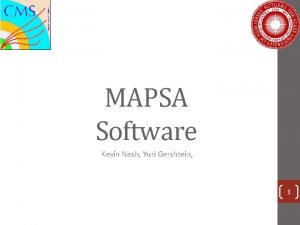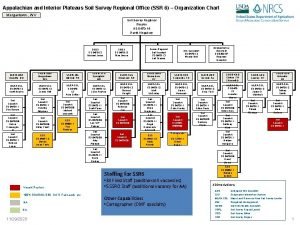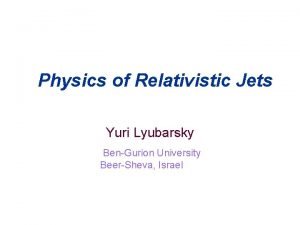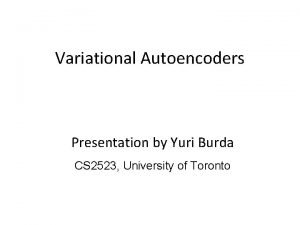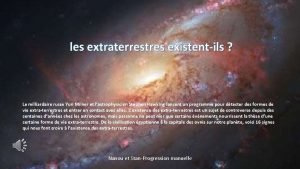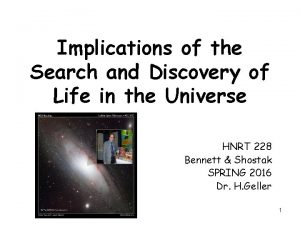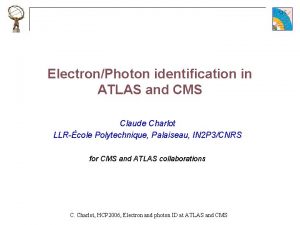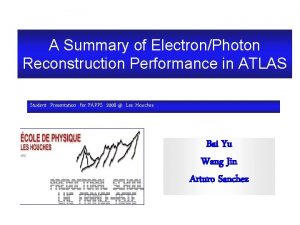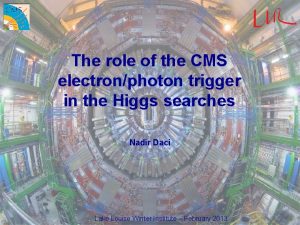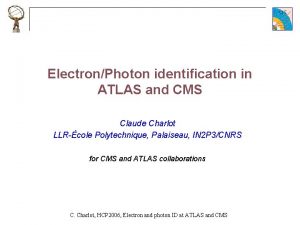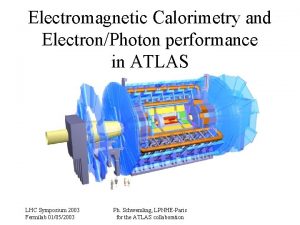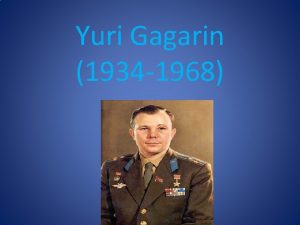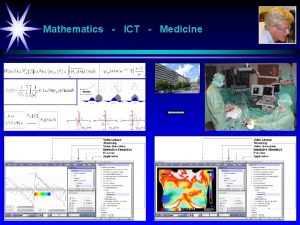ElectronPhoton Related Projects Yuri Gershtein 282007 Yuri Gershtein
















- Slides: 16

Electron/Photon Related Projects Yuri Gershtein 2/8/2007 Yuri Gershtein FIU CHEPREO Workshop

Disclaimer / Introduction PRS EGamma split into DPG and POG DPG – detector performace, service tasks: amplitude reconstruction, selective readout, DQM, calibartion, databases, etc. (Meridiani & Seez) http: //indico. cern. ch/conference. Display. py? conf. Id=11932 POG – electron/photon ID, energy scales, etc. Does not count as service work… (Futyan & Vanlaer) http: //indico. cern. ch/conference. Display. py? conf. Id=12082 LPC EGamma still discussing both topics and try to “cluster” the effort around subset of things people are interested in try to get most out of people who are not at CERN and can not spend 50% of their time there 2/8/2007 Yuri Gershtein FIU CHEPREO Workshop 2

Electrons and Photons Lead Tungstate crystals ~ 0. 02 Biggest challenge is the amount of material in front of the ECAL Cluster Reconstruction: find bumps in calorimeter cluster the bumps approximate window size ~ 0. 8 0. 06 Corrections: containment, cracks, energy loss in the tracker material Electrons and photons propagate differently electron continuously looses energy via Bremsstrahlung photons propagate intact until the first conversion Energy scales are different and depend on detector region (both rapidity and azimuth) and shower shape cuts 2/8/2007 Yuri Gershtein FIU CHEPREO Workshop 3

Tracker Material Description Method 1: photon conversions gives spatial material distribution Material at beam pipe is more dangerous than at ECAL face 2/8/2007 Yuri Gershtein FIU CHEPREO Workshop 4

Conversion reconstruction But the number of reconstructed conversions strongly depends on the amount of material here, too Want to sample material here Very tough to get rid of biases Can reconstruct 0 ee with calorimeter only If electrons from a photon do not brem “much”, direction of original photons and conversion point can be reconstructed from two calorimeter clusters Radial resolution ~5 cm 0 signal in QCD events 2/8/2007 Yuri Gershtein FIU CHEPREO Workshop 5

Tracker Material Description Method 2: resonance masses Tracks loose energy in material – mass peaks shift dependence on rapidity, energy, decay radius (for KS) so far task not taken (but need to verify with Tracker DPG) DØ 2/8/2007 DØ Yuri Gershtein FIU CHEPREO Workshop 6

Tracker Material Description Method 3: measure how electrons loose energy GSF track fit allows for large curvature changes along a track Energy loss due to brems can be measured (statistically…) Promising method to determine total amount of material C. Charlot, LLR p at vertex p at last tracker layer 2/8/2007 Yuri Gershtein FIU CHEPREO Workshop 7

Algorithms for Start-up To realize full LHC potential we need most sophisticated algorithms To commission detector we need first to find Z, W, Upsilon, etc Simple algorithms provide Easier start-up Redundancy and cross-check of sophisticated algorithms electron w/out pixels “standard” algorithm finds pixel “stubs” and start tracking from them Another algorithm w/out pixels is being developed. Will work when pixels are not there and will allow to check pixels efficiency when they are. simple fixed window clustering “standard” algorithm has different number of crystals per cluster. A fixed window algorithm will insure us from many possible hardware malfunctions Particle ID: shower shapes, isolation, etc 2/8/2007 Yuri Gershtein FIU CHEPREO Workshop 8

Efficiency from Data Tag and probe method: use Z decays Tightly identify one electron (and make sure that it gave trigger, too) The other electron is unbiased clean electron use invariant mass distribution to count them tag e Z ee Two back-to-back EM clusters BUT: possible hidden biases!! Do not expect MC to describe them exactly, but it should at least try… 2/8/2007 Yuri Gershtein FIU CHEPREO Workshop probe e 9

Tag and Probe + The efficiencies from tag and probe method are compared to that from MC truth. To plot efficiencies from MC truth, take SCs that match to the MC electrons of Z decays and ask for their matching with tracks. Duong Nguyen (Brown University) Tag and Probe 2/8/2007 MC truth Yuri Gershtein FIU CHEPREO Workshop 10

Tag and Probe (cont. ) Efficiency vs. transverse momentum Tag and Probe MC truth Cause of bias is under investigation 2/8/2007 Yuri Gershtein FIU CHEPREO Workshop 11

Z as Calibration Source High cross-section of Z reaction at LHC makes it possible to use three-body mass peak to measure photon energy scale, efficiency and resolution The strategy: Select two muons and very loose (and supposedly very efficient) EM cluster and count events in 3 -body mass peak – N 1 Apply ID cuts and count events in the peak again – N 2 Efficiency = N 2/N 1 Measure energy scale from the position of the peak after the ID cuts Measure resolution from the peak width The key is to get clean signal with very loose photon ID -> use kinematic cuts to suppress Z+jets Need to cut out DY: 40 < m( ) < 80 d. R(muon, photon) is small for Z : d. R<0. 8 p. T( ) > 15 Ge. V 2/8/2007 Yuri Gershtein FIU CHEPREO Workshop 12

Signal / Background Amazingly good S/B (~80) even before ID cuts! PYTHIA probably underestimates Z+jets Since S/B is so good, one should be able to study each discriminating variable for photon ID by itself and sort out the ones that are reproduced by the MC 2/8/2007 Yuri Gershtein FIU CHEPREO Workshop 13

High Energy Electrons compositeness New physics at DY tail may not come as a narrow peak… Systematic effects can fake a signal? Te. V-1 Extra Dimensions saturation leakage gain switches Would be nice to be able to check linearity at high energies with data 2/8/2007 Yuri Gershtein FIU CHEPREO Workshop 14

High Energy Electrons/Photons e+ recoil Balance electrons: energy varies with rapidity for same ET, so one can relate higher to lower energy electrons So far checked if we can “measure” shower leakage effects E. Carrera (FSU) e|ηtag|<0. 4 2/8/2007 Yuri Gershtein FIU CHEPREO Workshop 15

Summary Electrons and photons will lead to early physics A lot of preparatory work still to be done A large US effort FSU, Notre Dame, Minnesota, Cornell, Brown, Virginia, Kansas State (may be more soon) join the fun! 2/8/2007 Yuri Gershtein FIU CHEPREO Workshop 16
 Vddpst
Vddpst A series of coordinated related multiple projects
A series of coordinated related multiple projects A series of coordinated related multiple projects
A series of coordinated related multiple projects A series of coordinated related multiple projects
A series of coordinated related multiple projects A series of coordinated related multiple projects
A series of coordinated related multiple projects Chapter 1 modern project management
Chapter 1 modern project management A series of coordinated related multiple projects
A series of coordinated related multiple projects Health-related skills
Health-related skills Two types of physical fitness
Two types of physical fitness Yuri krotov
Yuri krotov Yuri plowden
Yuri plowden Choose the right word
Choose the right word Yuri lyubarsky
Yuri lyubarsky Yuri burda
Yuri burda Yuri milner
Yuri milner Knozorov
Knozorov Yuri klapouh
Yuri klapouh
